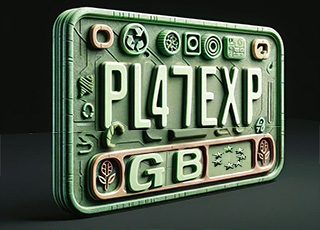Today, environmental consideration influences every aspect of our lives, steering multiple industries towards a greener future. The automotive sector can indeed take the lead in this revolution, implementing changes that reinforce its significance. From major components down to the minutiae such as number plates, adopting sustainable and eco-friendly practices is an essential step in the industry.
As a result, the automotive industry can lead from the front, making changes that underpin the role it plays. Sustainability and eco-friendliness are crucial across the automotive industry, including in basic elements like number plates.
In a world dealing with environmental challenges, sustainability is essential. It means meeting current needs without harming the ability of future generations to meet their own. In the automotive industry, where carbon emissions and environmental impact are significant concerns, adopting eco-friendly practices is a responsibility, not a choice.
Eco-friendly number plates are an essential component of this goal that reaches far and wide. Even though these plates might appear as a minor detail amidst the vast expanse of the automotive industry, they possess a surprisingly profound impact.
This article looks at sustainable materials and practices in the production of UK number plates. We will explore the latest trends in eco-friendly number plates, materials, and the importance of sustainable practices for both businesses and consumers. Join us on this green journey, where even the smallest of changes can contribute to a more sustainable automotive industry.
Sustainable Materials for Number Plates
The automotive industry’s ongoing journey toward sustainability has ignited a quest for the development of number plates crafted from eco-friendly materials. These sustainable materials are thoughtfully selected to reduce the environmental impact across the entire lifecycle, from production and usage to disposal. Several compelling options are gaining momentum in the pursuit of greener number plates:
1. Recycled Materials
Among the most promising and sustainable choices are number plates produced from recycled materials. These plates often incorporate recycled plastics, reclaimed metal alloys, or upcycled aluminium. Using recycled materials achieves a dual-purpose: it conserves valuable resources while simultaneously diminishing waste deposited in landfills. Recycled number plates epitomise the concept of environmental leadership, transforming materials that would have otherwise been discarded into practical and sustainable products.
2. Biodegradable Materials
The use of biodegradable materials marks a significant step away from traditional plastics. These materials boast the unique capability to naturally break down over time, substantially reducing the burden on the environment. Biodegradable number plates, often made from bamboo or organic polymers, seamlessly reintegrate with the earth without creating enduring waste. This eco-friendly option guarantees that the life span of the plates resonates in rhythm with nature, making them an enticing choice for those who are environmentally aware.
These materials possess the remarkable ability to decompose naturally over time, considerably alleviating the environmental burden. Biodegradable number plates, often composed of resources such as bamboo or organic polymers, gracefully return to the earth without leaving behind persistent waste. This sustainable choice ensures that the lifecycle of the plates aligns harmoniously with nature, making them a compelling option for the eco-conscious.
3. Sustainable Metals
Sustainable metals, such as aluminium, are emerging as another eco-friendly alternative for crafting number plates. Aluminium, known for its lightweight yet robust characteristics, offers a durable option that can be repeatedly recycled. This feature of recyclability contributes to its status as an environmentally responsible choice. These number plates present a combination of strength and sustainability, becoming a positive for the mindful use of materials that can be renewed without exhausting precious resources.
4. Natural Materials
Number plate production as an industry is witnessing an innovative approach through the use of natural materials. Woods, bamboo, and other renewable resources are being used to craft these plates. The advantage of natural materials lies in their inherent sustainability. They are lightweight, reducing energy requirements during production, and the renewability of these resources makes them an eco-friendly choice. This eco-conscious option seamlessly integrates functionality and environmental responsibility, providing vehicle owners with a sustainable way to display their identification.
Using these materials has both benefits and drawbacks. Recycled materials reduce waste, but finding high-quality ones can be difficult. Biodegradable materials are environmentally friendly but may require specific conditions for degradation. Sustainable metals like aluminium offer durability but may have higher initial production costs. Natural materials are renewable but may require additional care and maintenance.
The latest trends and developments in sustainable number plate materials continue to shape the industry. Companies are exploring new, innovative materials that balance eco-friendliness with functionality. The turn towards eco-friendly materials is not just spearheading a path for a more sustainable future, but it’s also ushering in exciting new market prospects.
Sustainable Practices in the Production of Number Plates
As we search for eco-friendly number plates, the adoption of sustainable practices throughout the production process is instrumental in minimising the environmental footprint. These sustainable practices encompass a spectrum of steps, from the initial sourcing of raw materials to the final assembly of the number plates.
1. Energy Efficiency
A fundamental element of sustainable production is the commitment to energy efficiency. Number plate manufacturers are increasingly leveraging energy-efficient production processes. This encompasses the use of low-energy machinery and the strategic optimisation of production layouts to curtail energy consumption. When such measures are adopted, substantial reductions in carbon emissions can be witnessed as a result, fostering a production process that is more friendly to our environment. The incorporation of energy-efficient machinery aligns with serious commitments to lower the industry’s energy demands, thereby reducing its environmental impact.
2. Waste Reduction
Have you ever considered the significant role waste reduction plays in manufacturing processes, especially in relation to number plates? It’s the crucial underpinning of truly environmentally conscious practices. Minimising the generation of waste at every production phase is a key feature of this. Just imagine, if we could apply measures like systematic recycling and the smart reuse of materials comprehensively… wouldn’t that be truly transformative?
Reducing waste generation throughout the entire production cycle is a linchpin of environmentally responsible practices. This involves the implementation of waste-reduction measures, such as comprehensive recycling and material reuse strategies.
Some forward-thinking manufacturers have implemented closed-loop systems, where waste materials are seamlessly reintegrated into the manufacturing cycle. Such circular economy approaches ensure that waste products find new life within the production process, significantly reducing the volume of waste that finds its way to landfills. This approach not only aligns with sustainability goals but also underscores a commitment to reducing resource consumption and waste generation.
3. Low-Emission Processes
The adoption of low-emission processes is a substantial leap towards greener production. This wide-reaching sustainable practice focuses on using environmentally friendly coatings and paints that release fewer volatile organic compounds (VOCs). Low-emission materials represent a critical contribution to cleaner air quality and reduced environmental harm. The reduction of VOC emissions is pivotal in improving the overall air quality in and around manufacturing facilities. By choosing low-emission materials, manufacturers make a significant stride towards a more sustainable production process, demonstrating their commitment to preserving environmental well-being.
4. Sustainable Packaging
Sustainability in number plate production extends beyond the manufacturing stage, acknowledging that the environmental impact continues through the entire lifecycle of the product. An essential part of this commitment is sustainable packaging. Many companies have transitioned from conventional packaging materials and practices to those that are eco-friendly. This strategic shift reduces the environmental contribution stemming from packaging waste. Eco-friendly packaging materials, coupled with efficient packaging practices, are indicative of an industry evolving towards a more sustainable future. This environmentally conscious approach to packaging underlines a dedication to minimising the environmental impact at every stage of the number plate’s journey.
These eco-friendly practices provide numerous advantages, benefiting the environment, businesses, and consumers alike. Manufacturers can save costs, enhance their reputation, and comply with environmental regulations by adopting sustainable practices. Consumers can make informed choices by supporting companies that prioritise sustainability.
Certification and accreditation play a crucial role in ensuring the sustainability of number plates. These standards confirm that the plates meet specific eco-friendly criteria. Certification is there to verify the use of sustainable materials, energy-efficient production processes, and adherence to low-emission standards. Consumers can look for certification labels as indicators of a company’s commitment to sustainability.
The Significance of Eco-Friendliness in the Automotive Industry
The automotive industry plays a substantial role in environmental degradation, with pollutants and greenhouse gases constantly being emitted. As car volume on our roads increases, so too does its ecological impact. Adopting environmentally friendly methods and products has shifted from being an option to a critical imperative for this sector.
With more vehicles on the road, its environmental footprint grows. Embracing eco-friendly practices and products is no longer a choice but a necessity for the automotive sector.
Environmental Impact of the Automotive Industry
The auto industry significantly affects the environment. It contributes to air contamination through its emission of troubling greenhouse gasses, notably carbon dioxide (CO2) and nitrogen oxides (NOx). These pollutants have been associated with wider scale environmental issues such as global climate change as well as individual health concerns, particularly relating to respiratory complications. Additionally, vehicle production consumes substantial resources and generates significant waste.
Benefits of Being Eco-Friendly
Adopting eco-friendly measures is not simply about minimising environmental damage, but it also brings with it a host of advantages:
Reduced Operating Costs
The adoption of green strategies, like incorporating sustainable materials and minimising energy usage, could potentially result in substantial cost reductions for companies. Processes that maximise energy efficiency in manufacturing can dramatically decrease running costs. Energy-efficient manufacturing processes can significantly lower operational expenses.
Improved Reputation
Eco-friendly initiatives enhance a company’s image and reputation. There’s a growing trend among consumers who favour green products, often showing more support towards companies that put a spotlight on sustainable practices.
Compliance with Regulations
Stringent government regulations, including emissions standards, are on the rise. Committing to eco-friendly practices is crucial for businesses to maintain compliance with both existing and forthcoming regulations.
Health and Safety
Lower emissions and reduced waste contribute to improved air quality and overall safety. This benefits both employees and surrounding communities.
Role of Government Regulation
Government regulations play a pivotal role in promoting sustainability within the automotive industry. These rules set environmental standards for businesses. For instance, the UK has laws enforced to reduce vehicular emissions and encourage sustainable strategies.
These regulations typically seek to cut carbon emissions, boost fuel efficiency, and set targets for environmentally friendly vehicle production. Manufacturers are increasingly focusing on making more hybrid and electric vehicles with reduced emissions and improved energy efficiency. They also encourage the use of sustainable materials in making vehicles.
Governments are initiating wide-ranging changes, and sectors like the automotive industry have a key part to play. Achieving such environmental targets means starting at the ground level, ensuring every component, including number plates, is as eco-friendly as possible.
The Future of Eco-Friendly Number Plates
In the UK, the prospects for eco-friendly number plates are abundant. As we navigate towards an era defined by technological strides and prioritise sustainability, it’s evident that our approach towards environmentally-friendly number plates will undergo noteworthy transformations:
1. Advanced Materials
Ongoing research and development are likely to bring even more sustainable materials for number plates. These materials may offer enhanced durability, reduced environmental impact, and innovative design options.
2. Enhanced Recycling
The recycling of number plates is expected to become more efficient. Manufacturers may implement closed-loop systems where old plates are reprocessed to create new ones, reducing waste and conserving resources.
3. Eco-Friendly Printing
Innovations in printing technologies are set to make the production process even more sustainable. This may include the use of low-impact, water-based inks and advanced printing methods that minimise waste.
4. Integration with Smart Technologies
Eco-friendly number plates could be integrated with smart technologies, allowing for real-time data collection and monitoring. This integration may have applications in traffic management, environmental monitoring, and vehicle-to-infrastructure communication.
5. Personalisation and Customisation
As eco-friendly materials become more versatile, vehicle owners may have increased options for personalising their number plates. These options can range from unique designs to colour choices that reflect the owner’s eco-conscious preferences.
While the future of eco-friendly number plates is bright, it also comes with challenges. These challenges include ensuring that the materials and production methods meet rigorous sustainability standards, addressing potential costs, and effectively recycling old plates. Nevertheless, the substantial positives of these green initiatives comfortably surpass the hurdles, proving them as an investment worth chasing.
Finally
In a world where environmental consciousness is at the forefront of what we do, sustainable practices in the automotive industry, even as minute as eco-friendly number plates, play a massive role. The sustainable materials and practices adopted in the production of these plates not only reduce environmental harm but also provide benefits to businesses and consumers alike.
As we navigate our way towards a more sustainable future, the role of every contributor within the automotive industry becomes more apparent. This includes manufacturers, consumers, government regulations, and sustainability organisations. Working together to foster greener practices is not merely an option within this sector, it has become a dedication towards creating a healthier environment for our sustainable world. As a significant role player, the car industry holds the opportunity to spearhead these crucial changes.
From manufacturers and consumers to government regulators and sustainability organisations, collaborative efforts are key throughout this process. Adopting sustainable practices in the automotive industry is more than just a decision; it signifies a dedicated effort at crafting a better, greener future. The car industry has a significant role to play and this is their chance to begin making a change.
The future of eco-friendly number plates holds exciting possibilities, from advanced materials to integrated smart technologies. With dedication, research and innovation, the eco-friendly number plate industry can lead the way in green automotive practices, making a significant contribution to the collective efforts for a more sustainable and environmentally responsible future.



